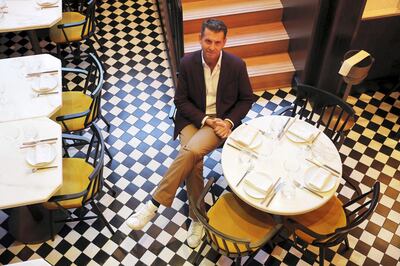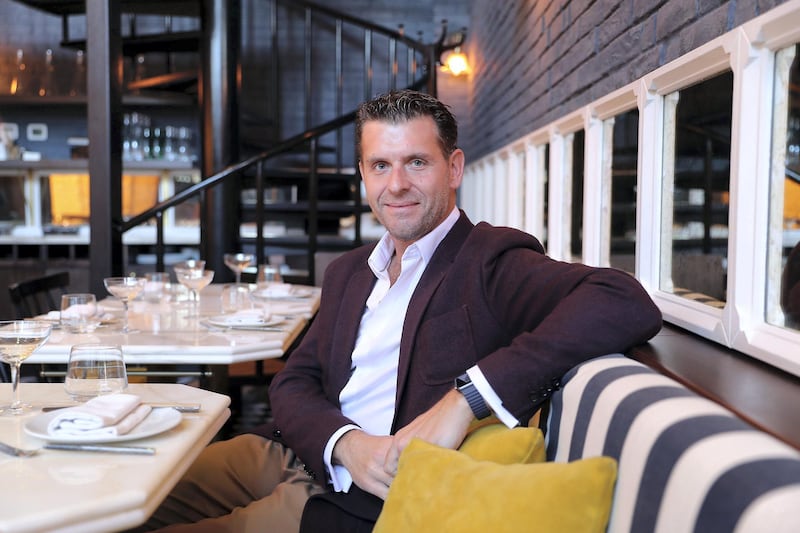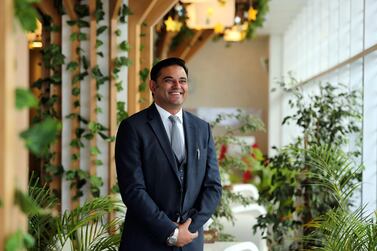Greek-Australian Spero Panagakis is the co-owner of BB Social Dining restaurant in Dubai International Financial Centre and chief operating officer of PSBars, a business and marketing consultancy for high-end food and beverage concepts across the Middle East. Mr Panagakis, 43, has more than 16 years of experience in the hospitality industry. After growing up and earning his university degree in Australia, he headed to London to start his career, where he oversaw the openings of such restaurants as Paternoster Chop House and the Michelin-starred Galvin La Chapelle. After a brief stint in Greece working for Starwood Hotels and Resorts, he moved to Dubai in 2012 to work as general manager of Japanese restaurant Zuma. He launched PSBars in 2014 and opened BB Social Dining in November 2017.
How did your upbringing shape your attitude towards money?
My parents were brought up in Greece in small villages and money obviously was very scarce to come by at the time. My father particularly — I call him the walking calculator — was very stringent with numbers. When migrating to Australia in 1960, he had the opportunity to be part of a supermarket investment, which was obviously little money. But he moved into supermarkets and his day-to-day life was all about margin control and cash flow. So that was instilled into our upbringing at home. And this is basically the lifestyle that we also live in restaurants.
What brought you to Dubai?
Dubai was truly an attraction. I see Dubai very similar in essence to how Australia had developed in its growing years. It’s such a multi-cultural and diverse society with opportunities to be able to expand industries as a general rule of thumb.
How much did you get paid for your first job?
I was a bartender in — of all places — Luton, just outside London. This was back in 1998; I was 21. I was earning £2.45 (Dh11.64) an hour with a weekly salary of £63. I had about £3 left each week in my pocket.
Are you a spender or a saver?
My father used to say ‘spend according to your pocket’ — in other words, if you don’t have it, don’t spend it. So that’s basically embedded into my head. I don’t deny that if I like something, I will go out and buy it. But [I believe that] if you’ve not saved for it, you don’t have the physical money, don’t think that the credit card is going to save you. You didn’t really buy it, you almost bought it on loan effectively until you pay it off.
What is your most cherished purchase?
BB Social Dining — truly that’s what I hold close to my heart. From inception to adaptation and now live, it’s a vision of the past 20 years of working with the goal of owning my own restaurant.
Where do you save?
Locally in bank accounts, and offshore. I have an offshore investment fund, so it’s basically a diversification of products, which ranges from different investment funds across the globe, so it’s not restricted to one type — whether it’s bonds or whether its property or minerals. It’s a versatile fund that now earns a basic interest per annum of around 7 to 8 per cent. I applied in the first month of landing in Dubai. Because I was travelling between countries, I was just very cautious of [not knowing] where I will be based because I didn’t want monies being locked up in various countries and not being able to be there to manage it directly.
How do you save money?
I use percentages. Whatever I earn, whatever comes in — whether it’s an income or salary — no less than 30 per cent has to go to a bank or savings account that will earn interest.
How did you decide on that percentage?
I bring it back to restaurants or to a great profit and loss statement where any great business, if it has the opportunity to bottom line profit at 30 per cent, it’s doing extremely well. So the return on investment is a lot greater at 30 per cent than it is at anything less. So I say, if you’re going to be good with your money, be like a great business. A great business is returning 30 per cent profit, therefore you should be saving 30 per cent of your earnings.

Do you own property?
I bought a one-bedroom apartment in London when I was there for £250,000. This was pre-Lehman Brothers crash, so back in 2007. East London was on the growth and the vision was obviously for the Olympics, so at the time it was when the property market was at its peak. I bought in thinking that ‘oh it’s East London, value for money, long-term opportunity’. Someone told me at the time ‘just be careful, because we’re at the peak of the cycle’. And, lo and behold, a year later the property market collapsed. I lost 15 per cent overnight.
I’ve had that property now for 11 years. At the time I lost 15 per cent, but now I’m up 35 per cent. I stuck with it, as opposed to panicking and trying to sell it. It wasn’t a ‘put all my eggs into one basket’ principle, where I’d have to pull out to be able to get some money back to survive. If you’re going to invest into something, invest what you can afford.
What do you spend on?
Rent is probably the highest cost that comes through — rent and weekly shopping. If I go back seven years ago, the average bag of groceries was coming in around Dh75 to Dh80. Six years later, we’re talking now, it’s no less than Dh120 to Dh130 a bag average. That cost increase hasn’t come with an income increase.
What would you splurge on?
The splurge is the annual family outing. Because we all live across the world from each other — my parents living in Australia and six months of the year living in Greece; my sister living in Australia; and myself and my brother living here in Dubai. For example, last year we all met in Santorini for three nights. We took advantage of a beautiful hotel, dining at a great Michelin star restaurant and drinking beautiful wine. That’s where I see value — reassuring that the time spent with family is precious and that’s of utmost importance.
What was your most expensive meal?
My most expensive meal was when I was travelling back home to Australia and visiting friends in Sydney in 2008. I managed to get a booking at Iceberg’s, just at the top of the cliff edge of Bondi Beach. It has the most panoramic view of all of Bondi and is known for its fine dining yet approachable modern Italian cuisine. Basically it was myself and my two best friends celebrating our 10-year reunion and a planned lunch turned into a long afternoon and into the early evening. A full tasting experience and beverages was AUS$1,000 (Dh2,600) per person. Was it worth it? Well to still remember it today, absolutely it was.
Do you have any financial regrets?
I’d say not applying the 30 per cent principle at a very early age. When you’re younger, [you think] you’re invincible. Thinking about the later stage of life is not a priority when you’re young, because you don’t feel like anything is ever going to happen to you. Education at a younger age I think now really needs to be instituted so that saving money is not tiresome, or is not a chore. People say ‘it’s so boring’ as a principle, but the effect and the result it gives you when you do save truly defines your mental safety and your mental security down the track, because you feel like you’ve got back up.








